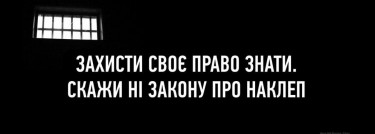Every week, the Global Voices Advocacy Netizen Report brings our readers the most up-to-date information on global Internet censorship, privacy issues, regulations, and more, from a variety of sources.
In a new series however, we will take a glance just at what's being reported on Global Voices Online, for an indepth look at how netizens the world over are reacting to increased Internet censorship.
In Ukraine, reports Veronica Khokhlova, citizens are protesting a draft law that calls for penalties of up to five years in jail for defamation. As Reporters Without Borders—which Khokhlova quotes in her analysis—has reported:
The lack of clarity surrounding the definition of defamation, which the bill describes as “disseminating false information, insulting the honour and dignity of a person or damaging his or her reputation”, arouses fears of abuse resulting from varying interpretations.
Khokhlova also shares an image from a Facebook group that is protesting the law (above), and writes that many are calling on Parliament to recall the law.
Further east, Global Voices’ Mong Palatino writes of Vietnam's crackdown on dissent. This past week, writes Palatino:
Vietnamese bloggers Dieu Cay, AnhBaSG, and Ta Phong Tan were found guilty by a Ho Chi Minh City court of violating article 88 of Vietnam’s criminal code, which involves the “spreading fabricated news in order to foment confusion among people” and “defaming the people’s administration.”
Nevertheless, as one blogger quoted in Palatino's story writes, “the government has announced bans on websites, only to see traffic to them skyrocket,” indicating the lack of sophistication required to keep up-to-date on censoring the Internet.
In a separate piece, Palatino covers increasingly strict regulations on Internet use in Southeast Asia, highlighting recent Global Voices articles and other blogs and noting that, while Southeast Asian governments are enhancing Internet access, they are also “instituting tougher internet regulations which many analysts believe could be used to curtail media freedom.”
In Spain, an “offline” censorship controversy is occurring, which author Victoria Fioravante describes as having created “widespread commotion among the internet community.” The controversy revolves around the censorship of a political satire program called ‘Carne Cruda’ (Raw Meat) by the director of Spanish National Radio 3 (RNE3). Fioravante points to a Facebook post [es] by the program's director, Javier Gallego, denying the reported reasons for the show's demise.
Global Voices shorter news “updates” can be a wealth of information, and this week's are no exception. A glance at the updates tagged “freedom of expression” provides insight into happenings all across the globe, some of which have gone unreported in English-language media:
- In Russia, Yekaterinburg-based Internet news portal URA.ru was raided by city police, notes author Andrey Tselikov.
- Iranian author Fred Petrossian points out that Iran's Telecommunications Minister plans to launch alternatives to US-based Google products.
- Latin America regional editor Silvia Viñas provides regional reactions to Paraguay's blocking of a news website, which Renata Avila reported on for Advox last week.
- Onnik Krikorian reports that a youth activist in Azerbaijan is believed to be arrested.





1 comment